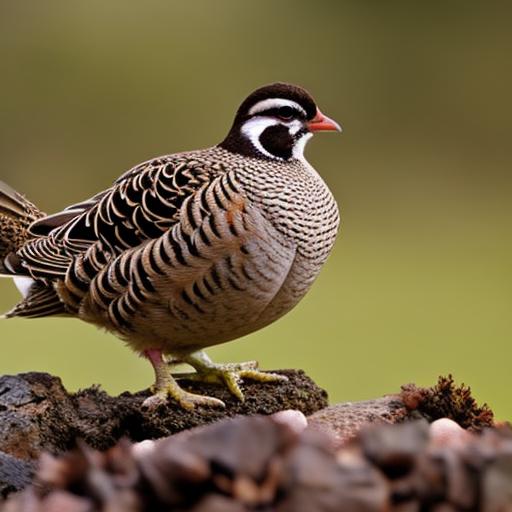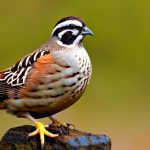Quails are small, ground-dwelling birds that are known for their social nature and active behavior. They are highly social animals and thrive in the company of other quails. In the wild, they live in groups called coveys, and they have a strong instinct to flock together for safety and companionship. Understanding this social behavior is crucial when keeping quails in captivity, as they can become stressed and anxious if kept alone. It is recommended to keep at least three to four quails together to ensure their well-being and happiness.
Quails are also known for their active and inquisitive nature. They enjoy scratching and pecking at the ground, exploring their environment, and dust bathing to keep themselves clean. Providing them with ample space to move around and engage in these natural behaviors is essential for their physical and mental health. Additionally, quails are known to be skittish and easily startled, so it is important to provide them with a safe and secure environment to reduce stress and anxiety. Understanding and accommodating these natural behaviors is key to providing a suitable living environment for quails.
Key Takeaways
- Quails are social birds that thrive in groups and exhibit natural behaviors such as dust bathing and foraging.
- Proper housing for quails should include adequate space, protection from predators, and nesting areas.
- A nutritious diet for quails should consist of high-quality feed, fresh water, and occasional treats like fruits and vegetables.
- Enriching a quail’s environment can be achieved through the addition of perches, hiding spots, and toys for mental stimulation.
- Cleanliness and hygiene are crucial for preventing diseases in quails, requiring regular cleaning of their living space and providing fresh bedding.
- Monitoring a quail’s health involves observing their behavior, checking for signs of illness, and seeking veterinary care when necessary.
- When handling and interacting with quails, it’s important to approach them calmly and gently, avoiding sudden movements and loud noises.
Providing Proper Housing and Space
When it comes to housing quails, it is important to provide them with a secure and spacious enclosure that allows for natural behaviors such as scratching, dust bathing, and foraging. A suitable housing option for quails is a large outdoor aviary or a spacious indoor enclosure with access to an outdoor run. The enclosure should be predator-proof, with sturdy walls and a secure roof to protect the quails from potential threats.
In terms of space requirements, it is recommended to provide at least 1 square foot of space per quail in the enclosure. This allows them to move around freely and engage in natural behaviors without feeling cramped or stressed. Additionally, providing hiding spots and shelters within the enclosure can help quails feel safe and secure, especially if they are easily startled. It is important to regularly assess the housing and space provided to ensure that it meets the needs of the quails and allows them to thrive in their environment.
Offering a Nutritious Diet
Quails require a balanced and nutritious diet to support their health and well-being. A high-quality commercial quail feed can serve as the foundation of their diet, providing essential nutrients such as protein, vitamins, and minerals. It is important to choose a feed specifically formulated for quails, as their nutritional requirements differ from other poultry species.
In addition to commercial feed, quails can also benefit from supplemental foods such as fresh fruits and vegetables, mealworms, and greens. These treats can provide enrichment and variety in their diet, as well as additional nutrients. It is important to monitor their food intake and adjust the diet as needed based on their activity level, age, and overall health. Providing access to clean, fresh water at all times is also crucial for quail health, as they can quickly become dehydrated if water is not readily available.
Enriching Their Environment
Enriching the environment of quails is essential for their mental stimulation and overall well-being. Providing them with opportunities for natural behaviors such as scratching, dust bathing, and foraging can help prevent boredom and reduce stress. Adding items such as branches, logs, and rocks to their enclosure can create a more stimulating environment for them to explore and interact with.
In addition to physical enrichment, mental stimulation is also important for quails. Providing them with toys or puzzles that encourage problem-solving and exploration can help keep their minds active and engaged. Simple items such as hanging mirrors or shiny objects can also provide visual stimulation for quails. Regularly rotating and introducing new enrichment items can prevent habituation and keep the quails engaged in their environment.
Maintaining Cleanliness and Hygiene
Maintaining cleanliness and hygiene in the quail enclosure is crucial for preventing disease and promoting overall health. Regularly cleaning the enclosure by removing soiled bedding, droppings, and uneaten food can help prevent the buildup of bacteria and parasites. Providing clean bedding material such as straw or wood shavings can help absorb moisture and odors, keeping the environment clean and dry.
In addition to cleaning the enclosure, it is important to regularly clean and sanitize food and water containers to prevent contamination. Monitoring the overall cleanliness of the enclosure and addressing any potential issues promptly can help prevent health problems in the quail flock. Good hygiene practices such as washing hands before and after handling quails can also help prevent the spread of disease between humans and birds.
Monitoring Their Health and Well-being

Monitoring the health and well-being of quails is essential for early detection of any potential issues or illnesses. Regularly observing the behavior of the quails can provide valuable insight into their overall health. Signs of illness or distress may include lethargy, decreased appetite, abnormal droppings, or changes in behavior. It is important to address any concerning signs promptly by seeking veterinary care if needed.
In addition to behavioral observation, regular health checks such as weighing the quails, examining their feathers and skin, and monitoring their egg production (if applicable) can help assess their overall health status. Keeping detailed records of their health and any observed changes can help track their well-being over time and identify any potential patterns or concerns.
Handling and Interacting with Quails
When it comes to handling and interacting with quails, it is important to approach them calmly and gently to avoid causing stress or injury. Quails are known to be skittish birds that may startle easily, so it is important to move slowly around them and avoid sudden movements or loud noises. When handling quails, it is best to approach them from the side rather than from above to avoid triggering their instinctive fear response.
Regular gentle handling from a young age can help quails become more accustomed to human interaction, making it easier to manage them for health checks or other necessary tasks. It is important to respect their boundaries and avoid forcing interaction if they appear stressed or uncomfortable. Providing positive reinforcement such as treats or praise during handling can help create a positive association with human interaction for the quails.
In conclusion, understanding quail behavior, providing proper housing and space, offering a nutritious diet, enriching their environment, maintaining cleanliness and hygiene, monitoring their health and well-being, and handling and interacting with them in a gentle manner are all essential aspects of responsible quail care. By meeting their physical, mental, and social needs, quails can thrive in captivity and bring joy to those who care for them.
If you’re interested in keeping quails happy, you may also want to consider creating a suitable living environment for them. Check out this insightful article on turning a shed into a chicken coop at Poultry Wizard. It offers valuable tips and ideas that can be adapted for quail housing, ensuring they have a comfortable and secure space to thrive.
FAQs
What are some basic needs for keeping quails happy?
Quails need a clean and spacious living environment, access to fresh water and a balanced diet to stay happy and healthy.
How much space do quails need to be happy?
Quails need at least 1 square foot of space per bird in their living area to be happy and comfortable.
What should I feed my quails to keep them happy?
Quails should be fed a balanced diet that includes a high-quality commercial quail feed, as well as access to fresh greens, fruits, and insects for optimal health and happiness.
How can I provide enrichment for my quails to keep them happy?
You can provide enrichment for your quails by offering them items to peck at, such as hanging vegetables or a dust bath area for them to keep clean and entertained.
What are some signs that my quails are happy and content?
Happy quails will be active, alert, and vocal. They will also have healthy appetites and produce regular, well-formed droppings.
Meet Walter, the feathered-friend fanatic of Florida! Nestled in the sunshine state, Walter struts through life with his feathered companions, clucking his way to happiness. With a coop that’s fancier than a five-star hotel, he’s the Don Juan of the chicken world. When he’s not teaching his hens to do the cha-cha, you’ll find him in a heated debate with his prized rooster, Sir Clucks-a-Lot. Walter’s poultry passion is no yolk; he’s the sunny-side-up guy you never knew you needed in your flock of friends!







